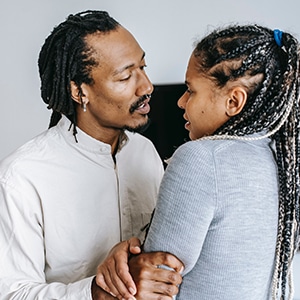Is it possible you are in a toxic marriage and don’t even realize it?
Being oblivious to signs of toxicity when emotions are involved is more common than you might think.
Sometimes, you might not realize your relationship is toxic until it’s too late, and you’re left drained. And despite your best efforts to fix the relationship, the problems persist, leaving you helpless.
If you believe you might be in a toxic marriage and wonder if there’s hope for things to get better.
The answer is yes.
You can eliminate toxic behavior patterns and rebuild a happy and healthy relationship.
Change starts with acknowledging unhealthy patterns in your marriage.
This article explores what it means to be in a toxic relationship and the warning signs of a toxic marriage.
Then, we’ll discuss how to start breaking toxic patterns and moving toward healthier ways of relating.
Table of Contents
What is a toxic relationship?

A toxic marriage involves destructive behaviors that harm you as an individual and a couple.
In a toxic marriage, communication is often non-existent or negative.
For example, one partner is overly critical of the other, causing guilt, shame, and insecurity.
Additionally, a toxic marriage includes imbalanced power dynamics where one spouse controls the other spouse’s actions or decisions.
Further, in a toxic marriage, there is often a lack of trust due to infidelity, secrecy, or frequent lying.
As a result, betrayal and resentment cause ongoing tension in the marriage.
Signs of toxic marriage & toxic spouse
Recognizing the signs of a toxic relationship can be challenging since these patterns often develop gradually over time.
By becoming aware of the signs of a toxic marriage, you can address toxic behaviors before they escalate and cause further damage to your relationship.
To gain more insight into the state of your marriage, take our free relationship checkup.
1. You can’t express your emotions or needs.

It can be difficult to express yourself freely with a toxic spouse.
For example, when you share your feelings, your partner responds with criticism or judgment, and your concerns about the relationship are either dismissed, minimized, or met with defensiveness.
Consequently, you may shut down and bottle your thoughts and emotions inside since speaking up feels unsafe.
Ultimately, it can seem like your partner is uninterested in hearing your feelings or fulfilling your needs.
2. You don’t go to your partner for emotional support.

During times of difficulty, it’s natural to seek comfort from your close friends, family members, and spouse.
However, if your partner is unable to provide the support you need, it can be frustrating.
Despite your efforts to open up, you may receive dismissive responses such as, “It’s not a big deal” or “Just don’t worry so much.”
This invalidation of your feelings is hurtful and detrimental to your relationship.
In a toxic relationship, you may feel like your husband wants sex but not emotional intimacy.
A healthy relationship involves giving and receiving emotional support; if your partner cannot provide that for you, it is a sign of a toxic marriage, or at least a sign you and your partner need to learn new skills.
3. You have harmful communication patterns.

After decades of research on married couples, Dr. John Gottman discovered four destructive communication styles that predict the end of a relationship (called the Four Horsemen). Take a look below and see if you can identify any of these toxic communication patterns in your relationship:
Destructive communication styles
- criticism
- contempt
- defensiveness
- stonewalling
Let’s break down these poor communication habits further.
Criticism
Criticism involves attacking your partner’s character.
For example, “You’re so lazy, you never pick up around the house.”
Contempt
Contempt is the most destructive force in a marriage.
When showing contempt, you assume superiority over your partner. Contempt can manifest in many ways, such as mocking or name-calling.
Defensiveness
Defensiveness is a response to criticism where you blame your partner instead of taking responsibility for your actions.
For instance, you say that you thought dinner would be ready by the time they were home.
If your partner gets defensive, they may say, “You know I’ve had so much on my plate today. Why didn’t you do it?”
Stonewalling
Stonewalling is when you shut down during a conversation with your partner. You give the ‘silent treatment’ or refuse to engage, which can negatively impact the relationship.
In toxic relationships, constant criticism, contempt, defensiveness, and stonewalling are destructive to the connection.
4. In a toxic marriage, you frequently argue.

In a toxic marriage, minor disagreements quickly escalate into blow-out fights.
Some days, it feels like you can barely have a conversation without ending up in an argument.
You fight about the same things, talking in circles without getting anywhere.
Sometimes, you and your partner may say or do things you later regret, such as name-calling.
Maybe your wife yells, or your husband yells.
Furthermore, you might be unable to come to a resolution or find a compromise.
Instead, you leave issues unresolved, and the same relationship problems keep repeating. And from there the whole cycle repeats itself over and over. If you’re having frequent blow outs, arguments, and struggle to get along, this is a critical warning sign of a toxic relationship.
5. You or your partner don’t take responsibility for your actions.

A sign of toxic spouses is an inability to take responsibility for their behavior.
With a toxic partner, you express how their actions hurt you, and they blame you.
They find a way to make the problems in the relationship your fault. Because they refuse to acknowledge their faults, they are closed off from hearing your concerns and unwilling to change their behavior.
Related Reading: My Husband Thinks He Does Nothing Wrong
6. Your partner displays narcissistic behavior.

A narcissist has an inflated sense of self-importance, which causes them to place their needs over the needs of others.
If your partner displays narcissistic behavior, they may place the blame entirely on you, minimize you, or gaslight you.
Gaslighting is a form of emotional abuse that causes you to question your sense of reality.
Your partner may be gaslighting you if:
- Your feelings and needs are repeatedly minimized or dismissed.
- They make you feel guilty for voicing a concern or setting a boundary.
- They repeatedly tell you you’re being ‘too sensitive.’
- You’re the one blamed when things go wrong.
- They deny certain events ever happened or tell you that your perceptions of events are inaccurate.
- You frequently feel a sense of confusion and self-doubt.
Being gaslighted has many detrimental effects, including decreased mental health and self-esteem.
It can be challenging to recognize gaslighting when it’s happening.
Even if you can’t pinpoint what’s happening, trust your inner knowing.
If your gut is telling you something is off, it probably is.
7. Your partner displays manipulative or controlling behavior.

If there is a power imbalance in your relationship, you may be married to a toxic person.
A controlling partner does not encourage your individuality.
Rather, they use manipulation to serve their own interests. For instance, a controlling spouse might dictate who you spend time with and prohibit you from making your own choices. If you’re worried about this in your relationship, we can’t stress enough how vital it is that you get support.
8. In a toxic marriage, there is a lack of trust.
Trust is one of the keys to a successful marriage.
If you don’t have trust, it can lead to insecurity, keeping secrets, or even lying.
Additionally, a lack of trust may lead to excessive jealousy or controlling behavior.
Trust doesn’t just break down because there is infidelity or because someone is lying. Trust can be broken when we don’t have emotional safety or safe conversations that lead to feeling connected, open, and vulnerable.
9. You feel like you’re walking on eggshells.

One of the signs of a toxic marriage is feeling like you have to walk on eggshells around your partner.
For example, you may never know what might set off your partner.
Therefore, you’re always on guard. You feel like you can never relax and be yourself.
Instead, you choose your words carefully. You’re hyperaware of your partner’s moods and adjust your behavior to prevent them from getting mad or upset.
If this behavior sounds familiar, you may be married to a toxic person, or you may just need hands-on support (like what we give inside our Communication Program).
10. You avoid talking about important emotional issues.

If you and your partner frequently avoid necessary conversations, you could be in a toxic marriage.
You might avoid bringing up certain topics because they inevitably lead to an argument.
You push down your needs to avoid conflict and keep the peace.
However, sweeping problems under the rug causes more resentment to build, and neither of you gets your needs met.
11. There is financial dishonesty.

Not being transparent about financial matters and lying about spending are signs of a toxic marriage.
For instance, one partner may have hidden bank accounts or be hiding money from the other partner.
Or one spouse might go on a spending spree without letting the other spouse know or lying about it.
Dishonesty about money is a betrayal that erodes trust in your marriage.
12. In a toxic marriage, there are patterns of infidelity.

Repeated events of infidelity signal a toxic pattern within a marriage.
Each time your wife or husband cheats, they apologize and say it won’t happen again.
However, their behavior never changes.
If your partner does not take ownership of their actions and is not committed to changing their ways, it can quickly become an unhealthy dynamic.
If this is happening, or has happened in your marriage, don’t delay getting help. Statistically most couples who don’t get professional support to heal from infidelity will stay stuck, hurt, and wounded.
13. You don’t make decisions together.
In a toxic marriage, you don’t come together to discuss important decisions.
Instead, your partner makes decisions that impact both of you. This is called “unilateral decisions.”
When one person makes choices alone that impact the both of you without your consent, it damages trust and security.
Consequently, you feel out of control in your day-to-day life. In many cases, couples can heal this toxic behavior by clearly outlining what types of decisions are for the couple, and which ones are ok to make alone.
14. In a toxic marriage, your partner violates your boundaries.

Boundaries are essential to you and your partner feeling safe and respected.
Toxic people repeatedly overstep your boundaries and ignore your requests.
For example, a toxic person might violate your privacy by looking through your phone or invading your personal space. In many cases, if this happens, there are other underlying issues of trust.
Boundaries are important for all of us, and when our relationship doesn’t have healthy ones — both partners suffer.
15. You or your partner are trapped in a cycle of addictive behavior.

Addictive behavior patterns (like substance abuse or compulsive porn use) are common signs of a toxic marriage.
You or your partner may turn to unhealthy methods of coping with tension at home.
However, addictive behaviors only distract from addressing the root issues in your marriage and lead to more turmoil.
16. Your partner displays abusive behavior.
Physical, emotional, or sexual abuse makes a marriage toxic.
If you have been hit, controlled through finances, or sexually assaulted by your partner — please seek professional support immediately. The negative side affects of being in such a relationship are longterm and require deep work that goes beyond what any article or video can offer.
If you are experiencing abuse, seek professional help immediately or call the National Domestic Violence Hotline at 1-800-799-7233.
17. In a toxic marriage, your partner isolates you from others.

In a healthy relationship, you and your partner encourage each other to maintain connections outside the relationship.
In a toxic relationship, your partner may try to prevent you from spending time with friends and family.
Recognizing when your partner isolates you from others can be challenging.
For example, they may say they ‘just want to spend more time with you.’
However, your partner might separate you from those who care about you to stay in control of the relationship.
18. People you trust have expressed concern about the relationship.

If trusted friends or family members express concern about your relationship, it’s worth paying attention to.
When deep feelings become involved, seeing your relationship objectively can be nearly impossible.
Therefore, it’s essential to rely on our support network to point out our blind spots.
When someone voices a concern about your marriage, it’s common to become defensive or annoyed.
You might think, ‘They just don’t know my partner like I do.’
However, when your initial reaction fades away, take the time to reflect.
Is it possible your partner displays toxic behaviors you’re afraid to see?
19. Your partner makes you feel guilty for doing your own thing.

In healthy relationships, there is a balance between spending time together and apart.
It’s perfectly normal for you and your partner to have your own interests, friends, and hobbies.
If your partner makes you feel guilty for requesting alone time, spending time with other people, or doing activities without them, you could be in a toxic relationship.
At the very least, this doesn’t feel good to your or your partner and it would be good to address this problem head on.
20. You constantly feel exhausted.

If you find yourself frequently drained or exhausted, a toxic relationship could be the cause.
Unhealthy relationships require tremendous amounts of energy.
The stress of trying to keep your marriage afloat takes everything you have.
As a result, you have less energy to give to your work or hobbies.
21. Your self-esteem has plummeted.
Losing your sense of self is one of the telltale signs of a toxic marriage.
Over time, you’ve felt yourself becoming smaller and smaller.
You’ve lost your self-confidence.
You feel like a shell of the person you once were.
22. You’re struggling with your mental health.

The stress of unhealthy relationships can lead to symptoms of mental health disorders, such as anxiety or depression.
Seek the support of mental health professional if you’re experiencing:
- Ongoing worry that interferes with your daily life.
- Persistent feelings of sadness, emptiness, or hopelessness.
- Increased irritability.
- Extreme fatigue.
- Difficulty concentrating.
- Changes in sleeping or eating patterns.
- Loss of interest in usual activities.
- Unexplained physical symptoms (like chronic headaches or muscle aches).
23. In a toxic marriage, there are extreme highs and lows.

Feeling like your marriage is a non-stop roller coaster signals a toxic situation.
One second, you and your partner are getting along, and things are going smoothly.
Then, a comment triggers your partner, and they explode.
Hurtful words are exchanged, and threats to leave are made.
It seems like your partner is always hurting you, or you’re hurting your partner.
Unhealthy love never quite feels safe or secure.
You’re holding onto the moments when things are good yet feel the weight of an unknown future.
24. There is a lack of affection between you.

A lack of intimacy and sexual satisfaction often indicates an unhealthy marriage.
In many marriages, physical intimacy ebbs and flows.
Sometimes, the spark gets dull and needs to be reignited.
However, in a toxic marriage, there are patterns of withholding affection and disregarding each other’s needs for touch and closeness.
You may worry that your spouse has lost attraction or is no longer in love with you.
25. A toxic marriage doesn’t allow you to grow.
Ultimately, your relationship should be a space where you become the fullest, brightest version of yourself.
In a toxic relationship, you don’t feel encouraged or supported to grow and change.
Instead, you’re trapped in a dynamic that keeps you stuck and dulls your energy and vibrance.
Can a toxic marriage survive?
For a toxic marriage to survive and become healthier, there must be a willingness to acknowledge the issues and actively work toward positive change. Fixing a broken relationship often requires seeking professional help through couples counseling or coaching.
Should you leave a toxic marriage?

If you resonate with the signs of a toxic marriage, you’re likely wondering, ‘What do I do now?’ Is it better to leave a toxic marriage or stay and hope things get better? As hopeless as you may feel right now, know there is hope. It is possible to save your marriage and transform your unhealthy relationship into a thriving one. However, for that to happen, both you and your partner have to commit to working on the relationship. Shifting the relationship dynamic requires you and your partner to identify unhealthy behaviors and develop new ways of relating. With expert support and guidance, you can uproot even the most engrained patterns in your marriage. You can break out of destructive patterns keeping you stuck and have the healthy and happy marriage you desire.
Seek support if you’re in an abusive relationship

There are some urgent reasons for ending toxic relationships, such as physical abuse.
It can be extremely difficult to decide to leave an abusive partner.
You may be hesitant to leave for many reasons, such as fear, concerns about your children (if your partner is the co-parent), and not having financial independence.
However, if your safety is at risk, seek professional help immediately or contact the National Domestic Violence Hotline at 1-800-799-7233.
Trained professionals can walk you through the steps to leave the relationship and put appropriate measures in place, like building a safety net or filing a restraining order.
Start rebuilding a healthy marriage

Let’s look at how to fix a bad marriage and rebuild a healthier relationship dynamic.
Honest communication
The first step towards salvaging a toxic marriage is honest communication.
Start by talking openly with your partner about the current state of your relationship.
Listen to your partner’s feelings without criticism or judgment.
Further, avoid responding defensively and take responsibility for your role in the relationship dynamic.
Through this conversation, you’ll gain insight into how your behaviors affect each other and better understand each other’s perspectives.
Willingness to change
Once you and your partner have identified unhealthy behaviors and patterns in your relationship, both of you need to be willing to make changes to stop the cycle of fighting.
Taking steps to change could look like
- Learning new coping skills for managing anger.
- Working on active listening.
- Attending counseling individually.
- Seeking relationship coaching together.
Even if you believe your marriage partner has more obvious toxic traits, you are still one-half of the relationship dynamic.
For your marriage to improve, both of you have to take responsibility for your actions and put in the work to grow and change.
Cultivate forgiveness

Another important aspect of saving a toxic marriage is offering and receiving forgiveness.
Forgiveness allows you to let go of the past and start fresh.
When you forgive your partner, you prevent built-up resentment from taking root in your marriage.
Additionally, forgiveness allows you to turn towards each other with gratitude and hope for the future you’re building together.
Commit to improving the relationship

Lastly, both you and your partner have to commit yourselves fully to mending the relationship.
Fixing a strained marriage does not happen overnight.
Just as patterns develop over time, it also takes time to unravel those patterns and build new ones.
However, with dedication and persistence, you can turn things around and get your marriage back on track.
Marriage coaching transforms toxic relationships
Working with a marriage coach allows you a safe space to identify harmful patterns in your relationship and rebuild a strong foundation for a healthy marriage.
A relationship coach will guide you to

- Develop healthy communication patterns so you both feel heard and understood.
- Tune into your partner’s emotions and show empathy.
- Talk about issues without blowing up or shutting down.
- Heal past hurts and rebuild trust.
- Set healthy boundaries that allow you to feel safe and respected.
- Build intimacy and enjoy each other’s company again.
Take a first step towards transforming your relationship today and book a complimentary couples consult.






0 Comments